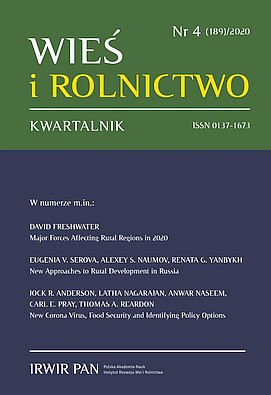Nowy koronawirus, bezpieczeństwo żywnościowe i identyfikacja wariantów polityk
DOI:
https://doi.org/10.53098/wir042020/05Słowa kluczowe:
pandemia, COVID-19, bezpieczeństwo żywnościowe, łańcuchy dostaw, politykiAbstrakt
Osiągnięcie poziomu bezpieczeństwa żywnościowego obejmującego wszystkich ludzi od dawna jest głównym celem polityki publicznej w każdym kraju. Jest to także wyzwanie w skali globalnej, zgodnie ze współczesnymi celami zrównoważonego rozwoju ONZ. Początek pandemii COVID-19 w 2020 r. ujawnił dodatkowe wyzwania dla decydentów w dziedzinie polityki żywnościowej. W niniejszym artykule opisane zostały niektóre kluczowe elementy tych wyzwań i odpowiedzi na na nie.
Bibliografia
AGRA (Alliance for a Green Revolution in Africa) (2020). Policy Response for Rwanda (COVID-19 Pandemic and its Impact on Agriculture and Food Security). https://agra.org/wp-content/uploads/2020/06/Rwanda-COVID-19-Policy-Response-Package_June-2020.pdf
Alston J.M., Pardey P.G., James J.S., Andersen M.A. (2009). A review of research on the economics of agricultural R&D. Annual Review of Resource Economics, 1, 537–565. DOI: https://doi.org/10.1146/annurev.resource.050708.144137
Anderson J.R. (2020). Agricultural Extension Policy: A 2020 Re-Vision. Working Paper. Rutgers University, Feed the Future Policy Research Consortium. New Brunswick: Rutgers University. http://ru-ftf.rutgers.edu/Outputs%20for%20webpage/Anderson%20WP%202020.pdf
Brewis A., Workman C., Wutich A., Jepson W., Young S. (2020). Household water insecurity is strongly associated with food insecurity: Evidence from 27 sites in low‐ and middleincome countries. American Journal of Human Biology, 32 (1), e23309. DOI: https://doi.org/10.1002/ajhb.23309
FAO (Food and Agriculture Organisation of the United Nations) (2020a). Several policy briefs. Rome: FAO. http://www.fao.org/2019-ncov/resources/policy-briefs/en/
FAO (Food and Agriculture Organisation of the United Nations) (2020b). Extension and advisory services at the frontline of the response to COVID-19 to ensure food security. Rome: FAO. http://www.fao.org/3/ca8710en/CA8710EN.pdf
Masters W.A., Rosettie K.L., Kranz S., Danaei G., Webb P., Mozaffarian D., the Global Nutrition and Policy Consortium (2018). Designing programs to improve diets for maternal and child health: estimating costs and potential dietary impacts of nutrition-sensitive programs in Ethiopia, Nigeria, and India. Health Policy and Planning 33 (4), 564–573. DOI: https://doi.org/10.1093/heapol/czy013
Post L.A., Argaw S.T., Jones C., Moss C.B., Resnick D., Singh L.N., Murphy R.L., Achenbach C.J., White J., Issa T.Z., Boctor M.J., Oehmke J.F. (2020). A SARS-CoV-2 surveillance system in Sub-Saharan Africa: Modeling study for persistence and transmission to inform policy. Journal of Medical Internet Research, 22 (11), e24248. https://www.jmir.org/2020/11/e24248 DOI: https://doi.org/10.2196/24248
Reardon T., Echeverría R., Berdegué J., Minten B., Liverpool-Tasie S., Tschirley D., Zilberman D. (2019). Rapid transformation of food systems in developing regions: Highlighting the role of agricultural research and innovations. Agricultural Systems, 172, 47–59. DOI: https://doi.org/10.1016/j.agsy.2018.01.022
Reardon T., Bellemare M.F., Zilberman D. (2020). How COVID-19 may disrupt food supply chains in developing countries. In: J. Swinnen, J. McDermott (eds.), COVID-19 and Global Food Security, (pp. 78–80). Washington, DC: International Food Policy Research Institute. DOI: https://doi.org/10.2499/p15738coll2.133762_17
Saini S., Kozicka M. (2014). Evolution and Critique of Buffer Stocking Policy of India. ICRIER Working Papers. New Delhi: Indian Council for Research on International Economic Relations. https://www.econstor.eu/bitstream/10419/176301/1/icrier-wp-283.pdf
Swinnen J., McDermott J. (eds.) (2020). COVID-19 & Global Food Security. Washington, D.C: International Food Policy Research Institute. DOI: https://doi.org/10.2499/p15738coll2.133762
Torero M. (2020a). COVID-19 and Food Supply: A Four-Pronged Battle Plan for Countries. Retrieved from: https://maximotorero.com/2020/03/23/covid-19-and-food-supply-a-four-pronged-battle-plan-for-countries/ (accessed: 28 June, 2020).
Torero M. (2020b). Coronavirus Food Supply Chain Under Strain. What to do?. Rome: FAO. Retrieved from: http://www.fao.org/3/ca8308en/ca8308en.pdf (accessed on 23rd of July, 2020).
Zhong R. (2020). $9 cabbages, emergency pork: Coronavirus tests China on food. New York Times, February 5, 2020. https://www.nytimes.com/2020/02/04/business/china-coronavirus-food-prices.html (accessed: 6 July, 2020).
Pobrania
Liczba pobrań artykułu
Strony
Jak cytować
Numer
Dział
Licencja
Prawa autorskie (c) 2021 Wieś i Rolnictwo

Utwór dostępny jest na licencji Creative Commons Uznanie autorstwa 4.0 Międzynarodowe.










